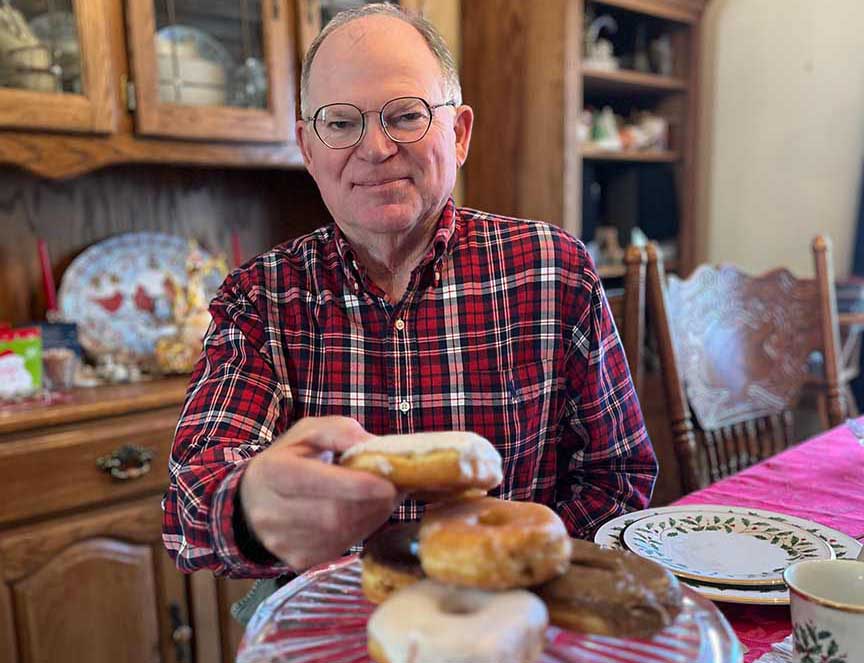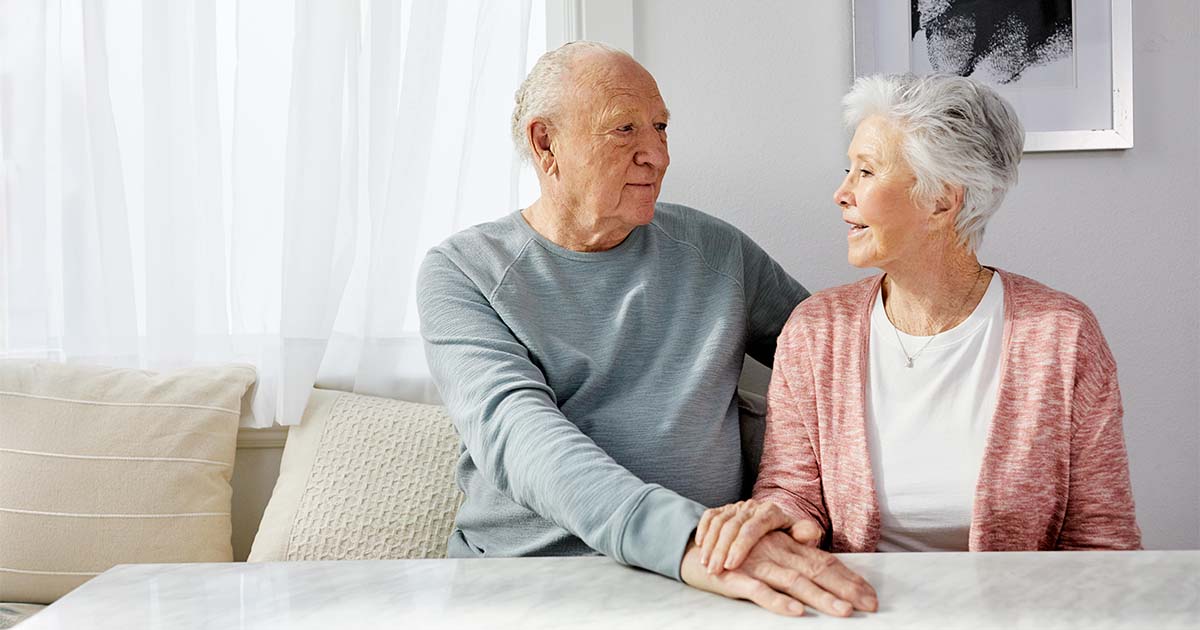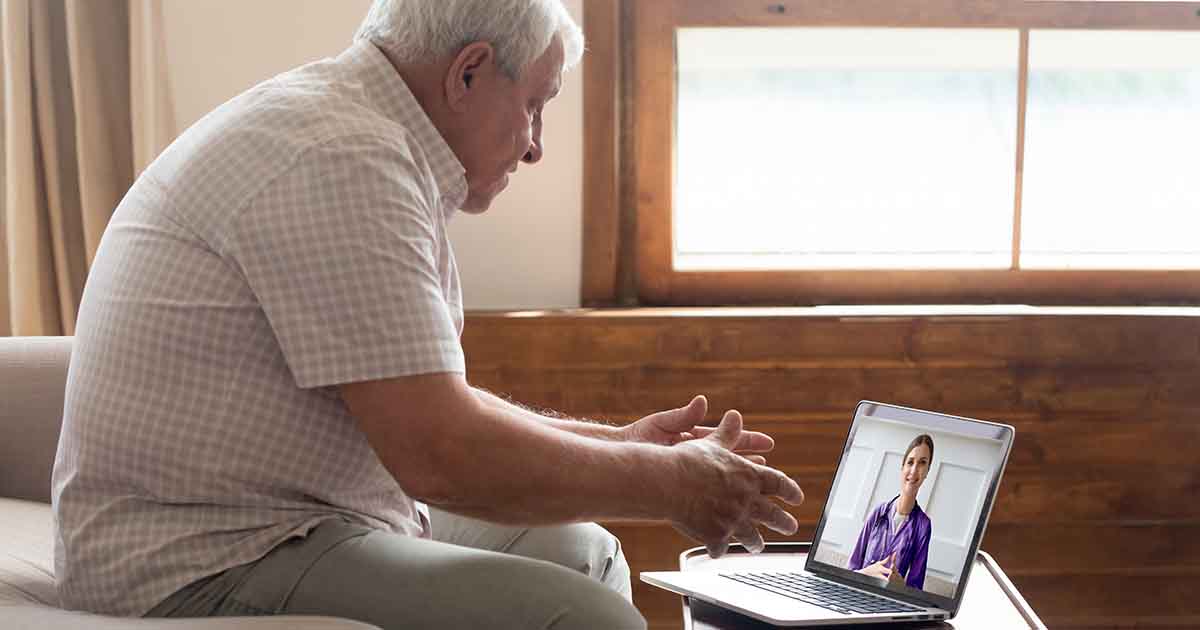After a patient has a major medical event such as a stroke, it is common for them to set recovery goals. These can be anything from walking up the stairs or getting dressed independently. Each patient’s goal is personal and built around what matters most.
For Enhabit Home Health & Hospice patient John, his stroke recovery goal was unique and related to his favorite food: he wanted the ability to eat a donut again.
Effects of John’s stroke
John started home health service with Enhabit after having a massive stroke in his basal ganglia. This is one part of the brain that is responsible for telling the body how to move. It does so by approving or rejecting movement signals sent to the brain. The basal ganglia are also responsible for other essential functions such as language and mood.
When this area of the brain is affected via a stroke, it can have major effects on a person’s mobility and communication processes. John’s stroke affected most of the right side of his body including his hand, arm, leg, foot, speech and swallowing.
A community- and family-oriented man, John’s stroke impacted his daily activities, making his life look a little different than before.
The impact of John’s stroke
Before his stroke, John considered himself the handyman of the house. His wife could rely on him to get anything done – from screwing in a lightbulb to mowing the lawn. He also was heavily involved in his church community and taught an after-school program for Sunday school.
John wasn’t just a handyman and community member – he was a grandpa too. He and his wife often traveled to a different state to visit their grandchildren.
John’s stroke meant that he couldn’t do any of these activities anymore – and that affected his sense of self and independence.
“John’s stroke had a sad impact on both him and his wife,” Amy, the speech-language pathologist on John’s care team, said. “Not only did they not have their social community anymore at church, but since John was so independent and one of those people who could fix anything, not being able to maintain his home or do things for his wife anymore was really hard for him.”
John’s stroke impacted the bigger picture items such as his sociability and self-identity but it also affected smaller parts of his life and routine. Living in a multi-level home, he now struggled to get to and from his bedroom independently.
Although John’s stroke left major effects, he didn’t let that get him down.
“John is very determined and focused,” Amy said. “He has that personality where he is just going to get through a hardship like this.”
John’s positive outlook on his rehabilitation set the stage for his stroke recovery goal. His swallowing and arm and hand mobility were affected but nothing was going to stop him from enjoying his favorite sweet treat again.
John’s sweet stroke recovery goal
While some patients have big milestone goals related to their hobbies or passions, John’s was more attributed to his sense of humor. He simply wanted to enjoy eating donuts with his right hand again.
With his sweet goal in mind, the Enhabit team worked with John in physical therapy, speech therapy and occupational therapy.
Physical therapy was the first thing to address, and the team wanted John to work on going up the stairs and moving parts of his hands and feet. At first, John needed maximum assistance to do any kind of walking or movement. He had to rely on his wife to help him function.
Occupational therapy was next in John’s care plan. Considering his hand was entirely non-functional initially, the occupational therapy team wanted John to accomplish small, functional tasks first. These included things like turning door knobs and holding pens before moving on to harder, everyday tasks like opening jars and writing.
Once John’s mobility was slowly regaining, Amy was able to help John with his communication and swallowing. After working with physical, occupational and speech therapy, John was many steps closer to his stroke recovery goal.
Quick gains in John’s stroke recovery
He was soon able to open jars, feed himself and write with his right hand. He also started walking a couple of miles a day around his neighborhood. This was an activity he enjoyed daily before his stroke.
And after some hard work and even more laughter and jokes, John’s swallowing and speech issues are back to normal. He is even able to volunteer again and teach his Sunday school class.
But most importantly, he can eat all the donuts he wants with his right hand again.
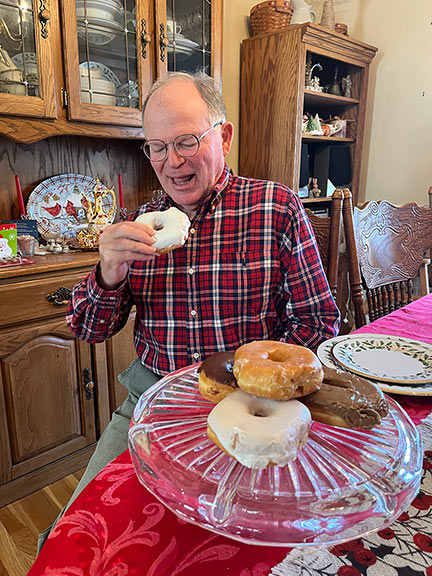
Reaching his stroke recovery goal
The day that John reached his goal of eating a donut with his right hand, he didn’t have too much of a reaction – just a few jokes, as normal. But he was very happy to enjoy the sweetness of his favorite food again.
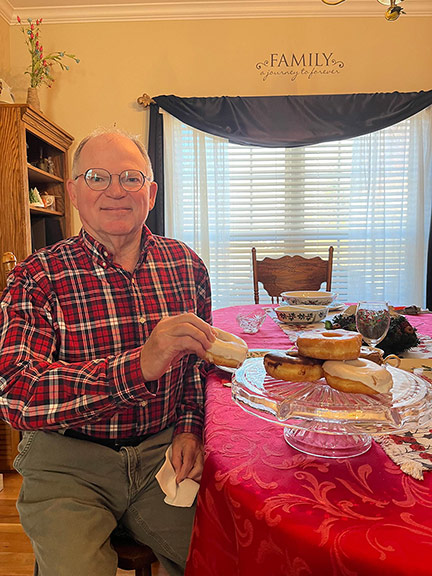
John is known for his dry jokes and little emotion, but his wife – who was there at every appointment and facilitated all of his care – felt the emotion of the moment.
“She was so thankful and grateful for Enhabit because their neurologist and other physicians had no hope that John would recover,” Amy said. “There were a few times where John would reach a goal or milestone and I could see the awe – and the tears welling up – in his wife’s eyes.”
A sweet success
Now that John has made quick gains and reached his stroke recovery goal, Amy says he feels like his old self.
“It was defeating for him considering how independent he was and how that changed since his stroke,” Amy said. “Reaching his goals has been a real confidence booster and encouragement to keep moving forward.”
John keeps reaching goals he never thought possible. In fact, John passed his driving test and is back on the road, traveling to see his grandkids now. He and his wife even sometimes pick up donuts to eat on their way out of town.
“John’s determination, perseverance and the unwavering support from his care team have truly paid off,” Amy said. “This achievement is not just about eating a donut; it’s a symbol of hope, strength and the power of never giving up.”
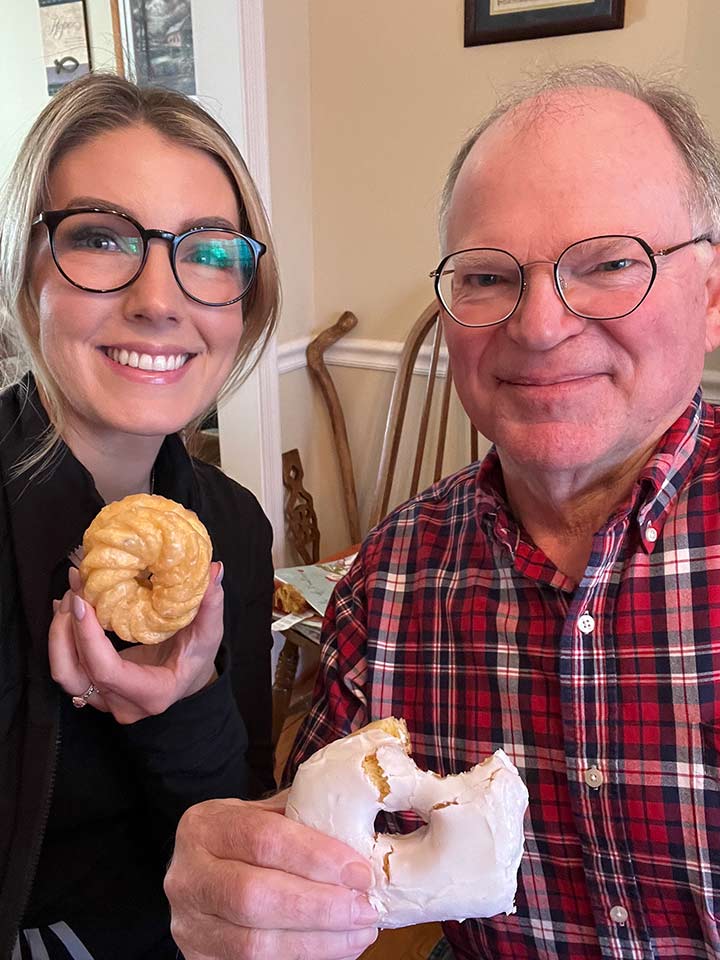
Social Share
At Enhabit our patients are our number one priority. From providing the latest medical practices to building deep personal connections, we’re focused on upholding every patient’s dignity, humanity and sense of control on their health care journey.
Home health
Our home health services give patients access to the care they deserve in the comfort of their own homes. From disease and injury management to recovery from surgery, our clinicians help patients confidently achieve their health care goals.
Hospice care
Our hospice care services place importance on the comfort of every patient living with a terminal illness. Our caring professionals are dedicated to providing not just physical care, but spiritual and emotional support to every patient and their loved ones.
